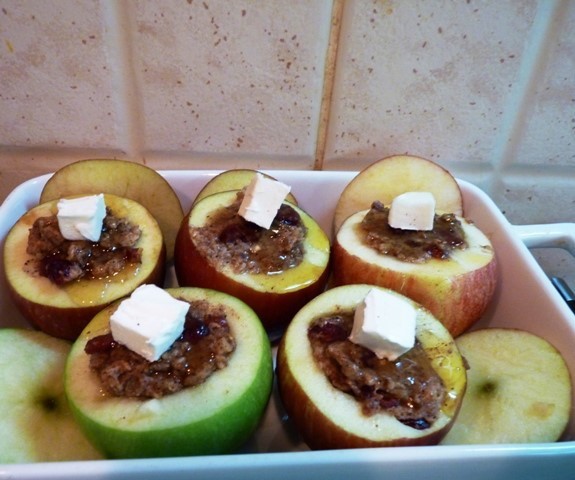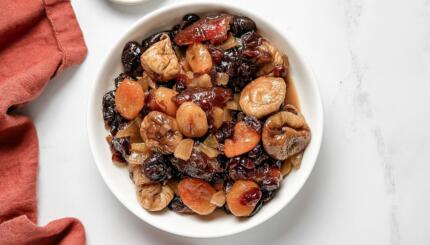Did you know that it is traditional to eat stuffed foods on Sukkot?
Originally, I thought it was just because they tasted good. Not quite content, I did a little bit of research and came up with a few answers.
Some say that we eat stuffed cabbage on Simchat Torah because if you put two of these bundles together they look the two tablets of the Ten Commandments.
This answer didn’t thrill me because two store-bought dinner rolls have the same effect, except they don’t require, blood, sweat, and tears to serve them.
The Nosher celebrates the traditions and recipes that have brought Jews together for centuries. Donate today to keep The Nosher's stories and recipes accessible to all.
A bit more digging and I uncovered another answer: we eat stuffed foods because they symbolize an overwhelming bounty. Fall is when farmers harvest wheat in Israel. A simple vegetable overflowing with delicious filling reminds us of our desire for a year of overflowing harvest.
In biblical times, farmers would put collecting their crops on hold to sit in a sukkah with their family and celebrate Sukkot. Sitting out on the field studying Torah with their children, these farmers were surrounded by two great desires; one, that this year’s harvest would be plentiful and two that like those vegetables, their year would be bursting with moments like that one, doing what they loved most, studying Torah with who they loved most.
In the year 2013, when most of us do not run out to cut wheat, and the closest thing we’ve done to harvesting is scope out sales at the mall, I think it’s time to give this ancient tradition a modern twist – and what better than with dessert!
This is a healthy autumn dessert that helps you stick to your new year resolutions. Or you can serve it with a side of vanilla ice cream or whipped cream. My favorite part about this recipe is that if I somehow end up with leftovers, I can have dessert for breakfast without even the slightest bit of guilt!
Ingredients
5 large apples (whichever variety you prefer)
1/2 tsp allspice
1 tsp cinnamon
1/4 cup of crushed walnuts
1/2 cup of almond milk
1/4 cup honey
1/4 cup of instant oatmeal
1/4 cup of craisins
1 1/2 Tbsp unsalted margarine cut into five small cubes
Directions
Preheat your oven to 375 degrees and boil 1 1/2 cups of water.
Place a small pan over a medium heat and toast your spices and nuts. Toast until they become fragrant, around 3-5 minutes. Make sure to keep an eye on them to prevent burning.
This shouldn’t take more than five minutes. Keep an eye on them while you continue with the recipe to prevent them from burning.
While you wait for you ingredients to toast, cut off the top of your apple.
You should cut off about 1/4 inch off the top, enough that it isn’t a wobbly thin slice of apple but a sturdy "hat" you can easily place back on top of your apple later.
Remove the center of your apples creating a hollow circle in the middle of your apple with an inch or so diameter. You can use an apple corer to help you remove the center of your apple. If you don't have an apple corer you can also using a paring knife or any small sharp knife.
Remember the hollowed core of you apple doesn’t have to be a perfect circle as long as you remove all the pits your apple is perfect.
Once your spices and nuts are fragrant, add the almond milk and honey and continue to heat.
Once your almond milk mixture is hot but not bubbling, stir in the oatmeal and craisins.
Cook the oatmeal stuffing for a few more minutes, until most of your almond milk has been absorbed, stirring every few minutes.
Fill your apples with approximately 1 1/2 Tbsp of filling so that they are entirely filled.
Place your apples into a small baking dish.
Put a single piece of margarine on top of each apple's filling and then the top of each apple in order to "seal" the apple closed.
Pour the 1 1/2 cups of boiling water into the baking dish along with the apples.
Cover your baking sheet with aluminum foil.
Bake your apples for 30-40 minutes while basting their stuffing with the cooking water every 10-15 minutes.
They are ready when the apples' stuffing is hot and the apples are soft but not mushy.
sukkah
Pronounced: SOO-kah (oo as in book) or sue-KAH, Origin: Hebrew, the temporary hut built during the Harvest holiday of Sukkot.
Torah
Pronunced: TORE-uh, Origin: Hebrew, the Five Books of Moses.



